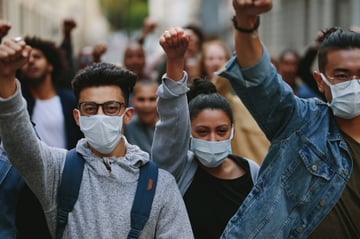Neighborhood-centered solutions to anti-Asian violence and racism - Nextdoor
Community resources for Asian American and Pacific Islander Heritage Month
Angela Chan is the policy director and a senior staff attorney managing the Criminal Justice Reform Program at Advancing Justice–Asian Law Caucus. Angela has worked on advancing immigrant rights and criminal justice reform for the past 15 years, including passing numerous state and local legislation to protect immigrants from being funnelled into immigration detention and deportation.
In August 2021, Tien Pham’s family stood outside the San Quentin State Prison in California, ready to bring home their son for the first time in 20 years.
Tien is a 38-year-old Vietnamese American. As a child, his family came to California as refugees. Tien’s father served with US troops as part of the South Vietnamese army and was later sent to a “re-education” camp. Once in the US, like so many in the Southeast Asian refugee community, Tien and his family struggled with violence and poverty as they worked to make ends meet and start a new life. Racial bullying as a child in San Jose led Tien to join a gang, a situation countless other Southeast Asian immigrant children have lived through after feeling like police and teachers wouldn’t protect them.
When he was a teenager, Tien was charged as an adult after a fight with another youth and was sentenced to 28 years in prison. After more than two decades, Tien was granted parole because he demonstrated his rehabilitation and developed a detailed reentry plan. As his release date approached, his parole process was expedited due to the COVID-19 outbreak at San Quentin.
And yet, with his family waiting outside, Tien never came out of the prison that day in August. Instead, he was transferred to a series of ICE facilities. In March this year, he was deported to Vietnam, ripped apart from his family and community. As Tien has said, “I have paid my debt to society and have been rehabilitated, but the state has punished me twice by transferring me to ICE for deportation. I want to stop the physical and mental suffering of people like me who state officials are turning over to ICE.”

-
Facebook
-
Twitter
-
LinkedIn
-
Pinterest
-
Gmail
Tien’s story underscores that anti-Asian violence is nothing new, and that it takes many forms. To build a world in which all communities can live in safety, we need community-centered solutions and radical reimagining. Systems of white supremacy have not and will not keep us safe, whether it’s an incident of interpersonal violence or the deeply entrenched policies of the US criminal legal system.
I’m the policy director and senior staff attorney at Asian Americans Advancing Justice – Asian Law Caucus based in San Francisco. Founded in 1972, we’re the oldest US civil rights organization serving low-income Asian American and Pacific Islander (AAPI) immigrants.
Across our work, we know that we must always look at our history to understand the roots of oppression and intergenerational trauma in the US, from the Chinese Exclusion Act of 1882 and the internment of Japanese Americans during World War II to the Vietnam and Korean Wars and the racist targeting of Arab, Middle Eastern, Muslim, and South Asian people following 9/11.
In the past few months, never forgetting this history, our country and AAPI communities have come together to grieve too many times. Amid rising incidents of anti-Asian hate and violence, we grieve the killing of eight people in Georgia, including six Asian American women, and of eight people in Indiana, including four members of the Sikh American community. We also condemn and mourn the police murders of Adam Toledo, Daunte Wright, Iremamber Sykap, Roger Allen, Matthew Zakok Williams, Ma’Khia Bryant, Mario Gonzalez, and too many others.
At the Asian Law Caucus, from our experiences working in the immigration and criminal justice systems to advocate for API community members like Tien Pham, we believe the solution to interpersonal violence is not more systemic state violence in the form of discriminatory and violent law enforcement that disproportionately harms Black and brown communities. In the last year, many policymakers and partners have asked us what they can do and support that will help communities truly be safe. With our partners at Asian Americans Advancing Justice – Los Angeles, SAALT, APALA, Asian American Legal Defense and Education Fund, Immigrants Rising, National CAPACD, and NAKASEC, we developed a policy guide with recommendations to address violence in ways that do not funnel yet more resources to law enforcement agencies and do fund communities’ safety, health, and well-being.
These recommendations include:
Establish rapid response networks to track and respond to incidents of hate and violence.
Community members who experience hate violence are often afraid to report to police for a variety of understanding reasons. To receive reports of and track hate violence, we recommend policymakers fund rapid response networks that are operated by community-based organizations. These networks could organize language-accessible and culturally competent community meetings and work with victims to develop safety plans and obtain compensation, among other actions.
Provide bystander training to educate and empower communities and neighbors.
As you have likely seen, reports of violence against Asian Americans show that these incidents often take place in public places, such as on the street, in stores, or on public transit. Bystander intervention trainings can help community members support victims, document incidents, and safety deescalate situations. We hold regular community training with Hollaback! and encourage all who are interested to participate and learn steps to help protect their neighbors.
Fund culturally competent and mental health services for victims.
Due to the longstanding underfunding of services for communities of color, it can be very difficult for Asian American victims of hate violence to receive culturally competent and language accessible mental health services. We’re encouraging policymakers to fully fund these vital services and training for mental health providers. For example, in California, the Asian Law Caucus is working with Assemblymember David Chiu on the Hate Violence Victim Support Act (AB 886), which will support culturally competent mental health services and restorative justice programs.
Our policy guide digs into these recommendations and others, and I invite you to read more and share with your friends, families, and colleagues. This month is Asian American and Pacific Islander Heritage Month. As we celebrate our histories and cultures and work in solidarity to craft a better future for everyone, these and other community-centered solutions can help pave the way.
To connect with your local neighborhood, please login at nextdoor.com.
Team Nextdoor
More from the blog
View All Posts
Nextdoor vitality efforts published in new study | Nextdoor
Read More
How every neighbor can take action against anti-Asian discrimination
Read MoreNextdoor’s policies and actions on hate and terror groups
Read MoreSubscribe to email updates
Stay up-to-date on what's happening at this blog and get additional Nextdoor content.
